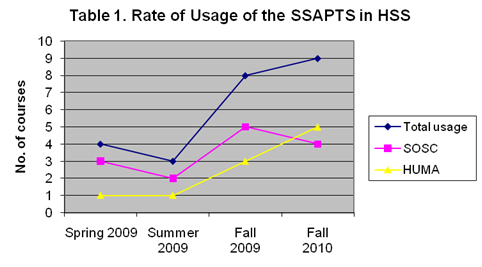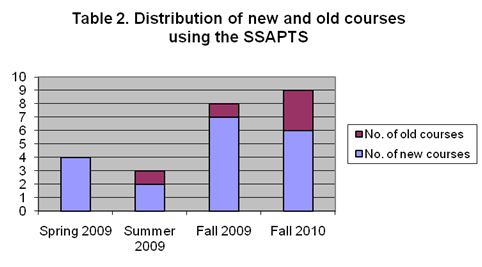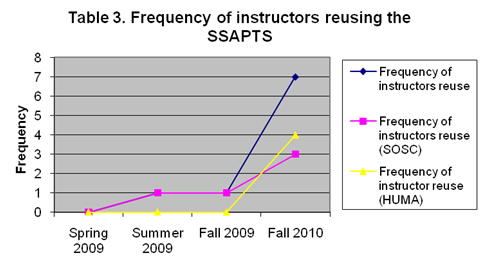
Student Self-Access Practice Test Sites (SSAPTS)
This project aims to help students consolidate what they have learned in classes and accomplish the desired learning outcomes. With unlimited access online at any time, students can practice via the tailor-made learning tools in the LMES course sites. Features include analytical MC questions, open and graded discussion questions, a writing enhancing program and samples of undergraduates’ high-quality written works recommended by instructors for students to read.
With these self-access learning tools provided via the course sites, students have progressive and interactive learning support that they can voluntarily access at their own pace. With the participation of 21 courses and 8 instructors in the Division of Humanities and Social Science, there were more than 3,600 students who had experienced with this project between spring 2009 and summer 2011.
Summaries of SSAPTS usage rate between spring 2009 and fall 2010:
| # | Items | Counts (Spring2009-Fall2010) |
Counts (Spring2009-Summer2011) |
|---|---|---|---|
| 1 | Frequency of students joined this project | 3,210 students | 3,663 students |
| 2 | Total no. of new courses | 19 courses | 21 courses |
| 3 | Frequency of reuse courses | 5 | 8 |
| 4 | Total no. of new instructors | 15 courses | 18 courses |
| 5 | Frequency of reuse instructor | 19 | 11 |



SHSS TA Training Workshop Spring 2011
Our project team co-organized the SHSS Teaching Assistants’ Training Workshop which had been successfully conducted on 8 February 2011 from 2pm to 5pm at Room 3365. 22 participants managed to complete the whole workshop.
Rundown of the TA training workshop
| Time | Topic | Facilitators | Remarks |
|---|---|---|---|
| 2:00p.m. – 2:50p.m. | On facilitating discussion – Online discussion forum | Mr. Yip Man-fung | Video recorded |
| 2:50p.m. – 3:30p.m. | On facilitating discussion – In-class discussion | Mr. Bell Christopher | Video recorded |
| 3:30p.m. – 4:00p.m. | Exercise – role playing | Mr. Bell Christophe & Mr. Yip Man-fung | / |
| 4:00p.m. – 4:10p.m. | Break | / | / |
| 4:10p.m. – 5:00p.m. |
On review questions generation
|
Ms. Bai Lian | Video showing |
| Download the TA training booklet |